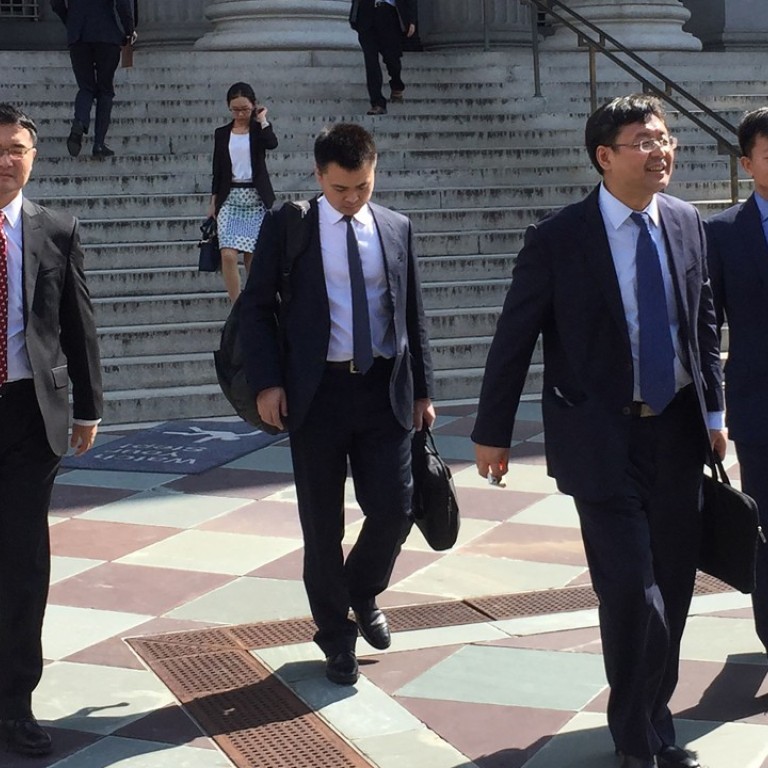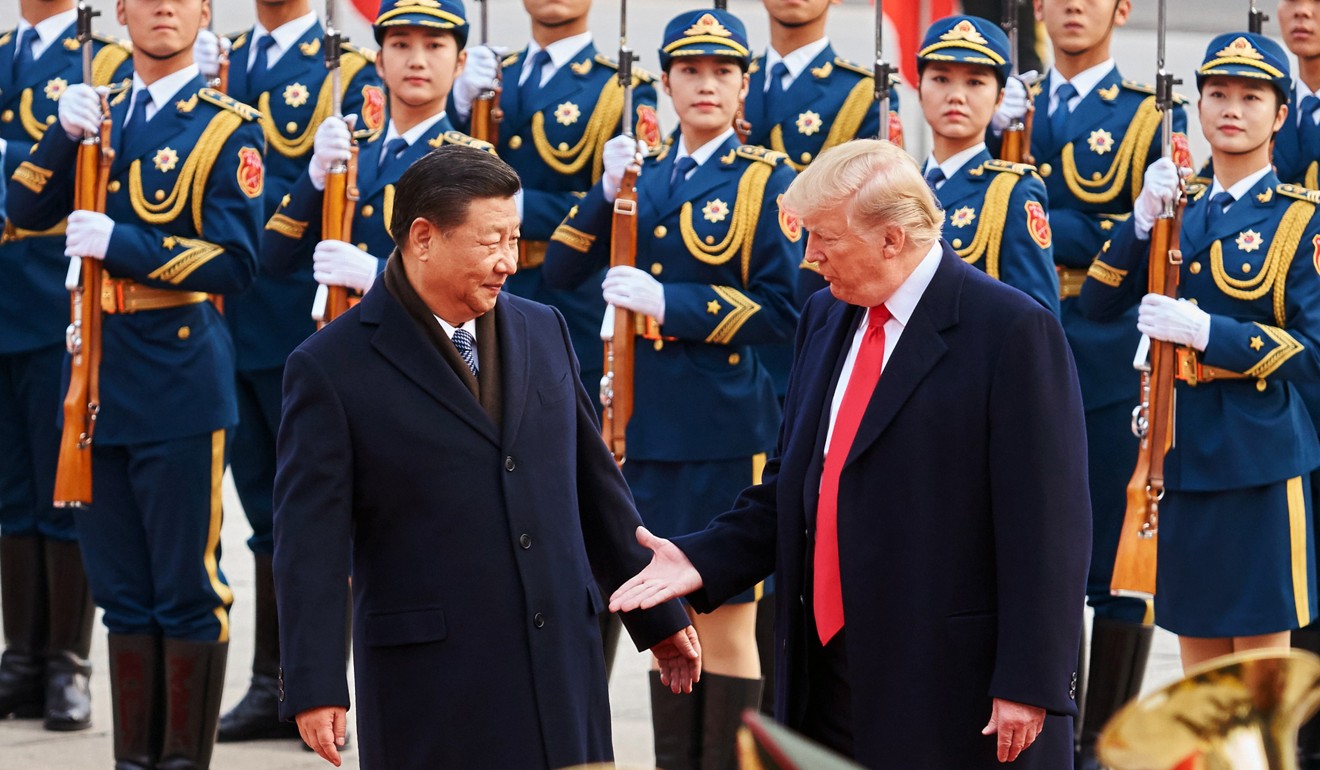
Latest US-China trade talks end not with a bang but a whimper, if heard at all
Two days of low-level negotiations ended on Thursday with no positive moves towards ending the trade war
Talks between the United States and China in Washington this week concluded with no concrete steps toward ending the bilateral trade war that started last month.
Since their announcement last week, the relatively low-level negotiations between representatives of the two countries have been clouded in scepticism from pundits and government officials on both sides of the Pacific – a scepticism that has apparently borne out.
At the invitation of the US, a Chinese delegation led by the vice-minister for commerce, Wang Shouwen, travelled to Washington for two days of talks starting on Wednesday. The discussions were hosted on the US side by Treasury Undersecretary for International Affairs David Malpass.
China slaps back at latest US tariffs in trade war escalation
A short statement released by China’s Commerce Ministry after the talks said the two sides had “constructive and frank exchanges” over trade issues, and would “keep in touch”.
White House Deputy Press Secretary Lindsay Walters told reporters: “We concluded two days of discussions with counterparts from China and exchanged views on how to achieve fairness, balance, and reciprocity in the economic relationship, including by addressing structural issues in China such as those identified in the Section 301 report”.
“We appreciated the Chinese delegation coming to the United States to participate in these meetings.”
Watch: Trade war fears for Chinese pork
Previous rounds of talks had involved China’s vice-premier Liu He and US cabinet-level department heads, including Treasury Secretary Steven Mnuchin and Commerce Secretary Wilbur Ross.
This is a mutual probing rather than a serious negotiation aimed at a deal. Neither the US nor China feels it’s time to back down
“If Liu He wasn’t able to have an agreement how could we expect a vice-minister of commerce to come to the US to have a negotiation with the department of Treasury rather than the US Trade Representative?” Yun Sun, East Asia Programme senior associate at the Stimson Centre, a Washington think tank, said in an interview.
“It’s not the right level, not the right people and it’s not the right institution.”
Yun continued: “I think the Chinese were interested in this round of talks because the tariffs have been in place for almost two months and they wanted to test the waters to see whether the Trump administration has at all recalibrated its bottom line,” Sun added.
“This is a mutual probing rather than a serious negotiation aimed at a deal. Neither the US nor China feels it’s time to back down.”
The lack of any progress lowers the chances that a chorus of opposition to the trade war from many US business groups will prevent the rift from harming the entirety of the bilateral trade relationship.
The US Trade Representative (USTR) has been phasing in tariffs since July 6 and Trump has threatened to slap them on all of China’s exports to the US if Beijing continues to retaliate.
Pessimism over the talks had taken hold even before they started.
Behind the US-China trade war lies a competition for dominance
Trump told Reuters on Monday that he did not “anticipate much” from the meeting, and that he had “no time frame” when it came to resolving the escalating trade war.
An administration official who briefed reporters on background on Thursday insisted that the president was open to “engaging with Chinese officials on these issues”, and that the US hoped China “will take seriously the concerns [we have] raised, and that that can put us on a better posture”.
But Trump administration officials did not wish “to create any expectation of any announcement coming out” of the meetings.

Meanwhile, the trade war continued its escalation on Thursday, as the US enacted punitive tariffs of 25 per cent on US$16 billion of Chinese imports, an action that was immediately mirrored by China.
China’s Ministry of Commerce said on Thursday that the latest US import duties violated World Trade Organisation rules, and that China had no alternative “but to take countermeasures”.
This week also saw the USTR hold an unprecedented six-day public hearing ahead of further tariffs on US$200 billion of Chinese goods, expected to go into effect in September. Initially proposed at 10 per cent, the duties could be raised to as much as 25 per cent, at Trump’s direction.
Tariffs are hidden tax on US consumers, retailers’ rep tells trade panel
The additional tariffs would effectively slap levies on half of all Chinese exports to the US, or roughly double what China imports from the US.
Witnesses have spoken of the potential of the punitive action to “decimate” their industries, which range from electronics to apparel to chemicals.
Echoing the testimonies of previous hearings, the USTR panel was told that further punitive action would slash profit margins for small and medium-sized businesses that rely on Chinese manufacturing, and would ultimately pass the financial burden on to end-customers, including public institutions like hospitals.
Watch: Are Chinese consumers less willing to buy US goods now?
Despite resistance from industry and business, support within the agricultural sector – a stronghold of Trump voters – remains solid. Presidential ratings among farmers are even on the rise in some states, despite the fact that soybean producers, many of whom rely exclusively on the Chinese market, are facing the worst of the tariff storm.
That loyalty is likely to be bolstered by a US$12 billion bailout for farmers that Trump approved last month.
China says US farmers may never regain market share lost in trade war
A deal on the North American Free Trade Agreement (Nafta), expected in the coming few days, could also leave Trump on firmer ground when it comes to maintaining his aggressive strategy towards trade with China.
Mexico and the US are expected to reach agreement on the deal by the end of this week, though Mexico’s commerce minister emphasised yesterday that a final handshake on the trilateral deal would require the presence of all three parties, including Canada.
Drawing attention to a deal on Nafta, should it go ahead, is likely to be a higher priority for the White House.
“Compared to the case of China, the room for negotiation is slightly bigger in the case of Mexico and Canada,” said Sun.
“If Trump is able to have better deals with America’s traditional trading allies then it will give him more leverage vis-à-vis China because one of China’s counter-measures was to try to build a global anti-Trump, anti-trade-war coalition with like minded countries, but [that] has failed with EU.
“And if Trump is able to have similar deals with Mexico and Canada, It would strengthen Trump’s position with China.”


